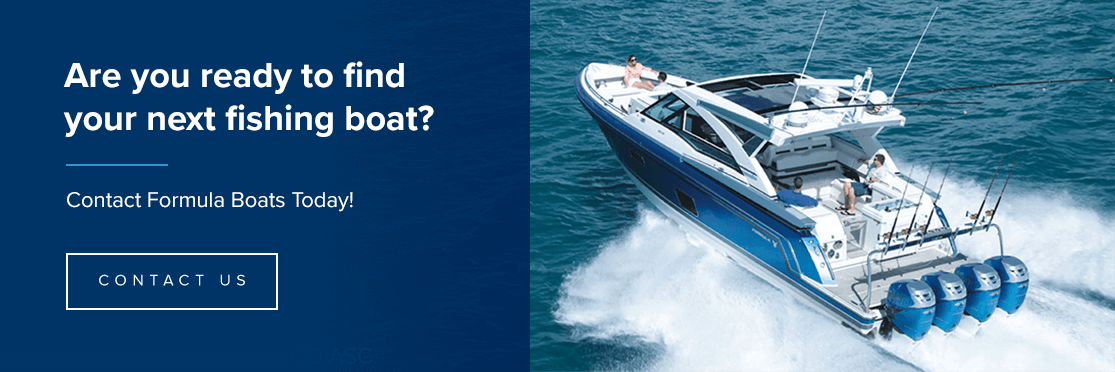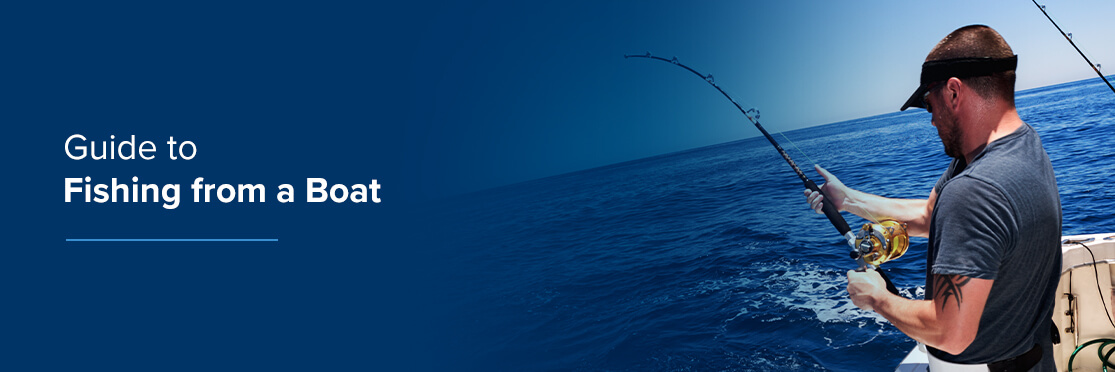
An exciting aspect of owning a boat is finding all of the new activities you can try. From playing water sports to watching a movie on your boat, you can enjoy many different activities. Many water-lovers enjoy fishing, and there’s nothing like fishing off of a boat.
You can fish in various bodies of water and discover new creatures as you reel them in. Fishing is a fun way to spend time with your friends or family on your boat.
What Do You Need to Fish on a Boat?
You’ll need to prepare your boat with proper fishing gear and equipment before you head out on the water. Having the right fishing equipment can make your fishing trip successful and safe for every person on the boat.
Whether you’re new to fishing on a boat or haven’t gone in a while, you can prepare with the right gear.
FISHING REEL AND ROD
The most essential item to bring fishing is your fishing rod. They’re designed to help you cast your line out far into deeper water and reel in heavy fish. The fishing rod you select depends on a few factors, including the type of fish you’re catching and the body of water you’re fishing in. You can differentiate between rods by their responsiveness, action, strength and taper.
The fishing reel is the second most important item. The fishing reel holds your fishing line and makes it easy to wind up the line. There are a few types of fishing reels, like spincast reels, spinning reels or baitcasting reels. Each type has its pros and cons for every kind of fishing and level of expertise. A good choice for boat fishing and beginners is the spinning reel.
HOOKS
Set up your fishing line with a hook to add your bait and catch your fish. It’s helpful to bring a good amount of hooks if you need to cut your line or if it falls off.
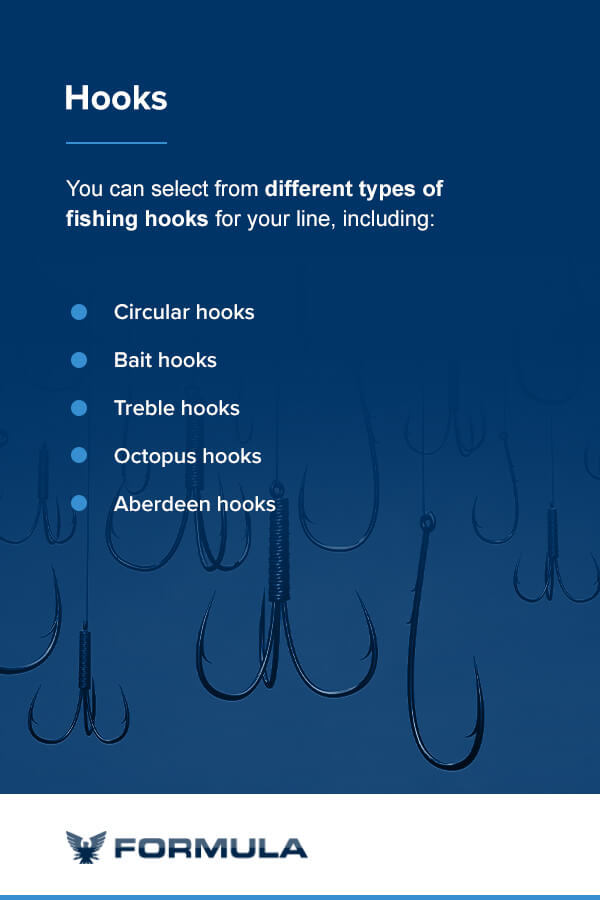
You can select from different types of fishing hooks for your line, including:
- Circular hooks: This hook is popular because it’s designed to prevent gut hooking a fish. Many state or local fishing and game regulations will suggest using circular hooks for the safety of the fish, especially if you plan to release them after you catch them.
- Bait hooks: This hook is a common hook option used for bait fishing. The hook has barbs on the shaft to help secure the bait.
- Treble hooks: This hook is great for cut or artificial bait. The treble hook has three hooks that make it easy to secure artificial bait like jerkbaits or crankbaits. Live or frozen bait like cut squid or minnows are also good for treble hooks.
- Octopus hooks: Octopus hooks are similar to circular hooks, but the curve is not as pronounced. These hooks are commonly used for bait fishing. They are lightweight and smaller in size, so the bait looks natural.
- Aberdeen hooks: This hook is made from light materials to hook live bait easily and do minimal damage, so it stays lively in the water. This hook is beneficial if you’re solely using live bait.
FISHING LINE
Fishing line is another essential item you’ll need for your boat fishing trip. You’ll feed it through your rod and reel so you can cast out a line. Your reel might come with fishing line if you purchase it new.
It’s helpful to bring extra fishing line when you’re going fishing on the boat. It’s common for fishing lines to tangle on rocks, buoys and other structures, so you may need to restring your reel.
You can choose from different colors, sizes and weights, depending on what you’re planning to catch and where you’re fishing. Fishing line is rated by visibility, castability and elasticity. When you’re fishing in rough or deep water with bigger fish, you’ll need a strong and heavy fishing line to help reel in your catches. If you’re fishing in calm and clear waters, a thin and clear line will do the job.
LURES
If you prefer using artificial or alternative bait, make sure you bring your lures on your boat fishing trip. Lures mimic fish swimming, so it grabs the attention of the creatures you’re trying to catch.
Lures come in all different shapes, sizes, colors and designs so people can hunt for specific types of fish or have successful catches in various weather or water conditions. Lighter-colored lures work well in clear waters so it doesn’t look too out of place, while bright-colored lures are suitable for murky waters so fish can spot them.
BAIT
Most people fish with live or frozen bait when they go fishing on a boat. Fish are attracted to different types of food, so you can choose from various bait. The type of bait you use also depends on what water you’re fishing in. For freshwater fishing, you’ll likely use minnows or worms for bait. If you’re going saltwater fishing, you’ll use bait like squid, pinfish or shrimp.
You can find bait at a local bait and tackle shop, or some common big-box stores will carry bait in their hunting section.
BOBBERS
Bobbers, or floaters, are fishing accessories that can help you know when you have a catch on your line. You’ll rig the bobbers onto your line, and they will sit at the surface of the water once you cast your line. The bobber will sink under the water when you catch a fish, letting you know it’s time to reel in your line.
You can use various types of bobbers on your line. The most recognizable ones are circular and are half red and half white. Other bobbers are longer in shape or made from cork. It’s easy to attach bobbers to your line and you can adjust the position of your bobber depending on how deep you need your line to reach in the water.
SWIVELS
Your line can get twisted when you use lures or live bait. Swivels allow the lure or bait to move freely without affecting your line. A swivel is an accessory that helps connect the lure or bait hook to your line and keeps your line from tangling. The swivel has a loop on either end, or you can purchase swivels that have snaps to attach and remove lures or bait hooks.
SINKERS
Sinkers attach to and help weigh down your line so the lightweight lure or hook doesn’t float to the surface. You can add one sinker or multiple and switch up your rig depending on the location you’re fishing in or the type of fish you want to catch.
Sinkers can be made of lead, tungsten, bismuth, brass or steel. You can find sinkers in different shapes and sizes, so bring a few different types on your trip to have options for your boat fishing rigs.
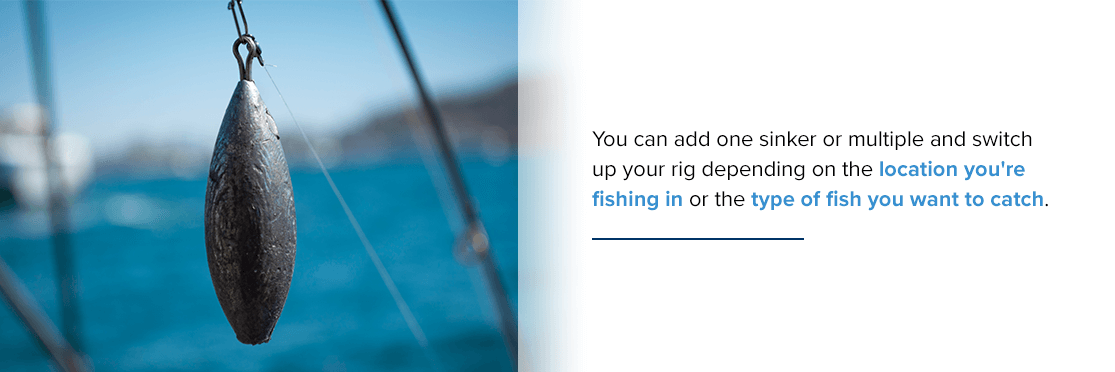
LINE CUTTER
Fishing line is strong and durable, so you’ll need a line cutter when you decide to switch up your fishing line or if it gets stuck on some rocks or other features in the water. You can purchase a specific line cutter, or use other items like a fishing knife, nail clippers or pliers.
NEEDLE NOSE PLIERS
Having a pair of needle nose pliers is beneficial for your fishing trip on the boat. Sometimes you’ll need extra help reaching hooks inside the fish’s mouth, and needle nose pliers can get the job done. They can reach deep in the fish’s mouth and keep your hands and fingers safe from teeth or barbs. You can use any type of needle nose pliers, but there are some that have unique shapes that can reach inside the fish’s mouth better.
FIRST AID KIT
Fishing is a fun activity you can enjoy on your fishing boat, but it’s important to be prepared for any accidents or injuries that occur. Bring a first aid kit with you when you go fishing or store one on your boat at all times.
SUNGLASSES AND SUNSCREEN
You’ll be spending plenty of time outside, so you should protect your eyes and your skin from the sun with sunglasses and sunscreen. It’s especially important to bring sunscreen and sunglasses on your boat because you’re exposed to a lot of sunshine out on the water. Wear other protective gear like hats and protective clothing to stay comfortable while you’re in the sun all day.
TACKLE BOX
You’ll need a storage container for all of your fishing accessories like your lures, hooks, swivels and sinkers. Organize all of your gear in a tackle box that is made for fishing products.
You can store other items in your tackle box like your pliers, line cutter and other products you’re bringing on your fishing trip. Tackle boxes come in various sizes, so you can find the one that will fit all of your items plus give you some room to grow your collection.
POLE HOLDERS
A helpful tool that you can add to your boat for your fishing trips is a pole holder. You can add a single pole holder or find pole holders that can hold several rods. This feature attaches to your boat and has a place for your rod to rest so you can be hands-free during your fishing trip. Once you see your pole bending or your bobber go down, you’ll know it’s time to pick up your rod and reel in your catch.
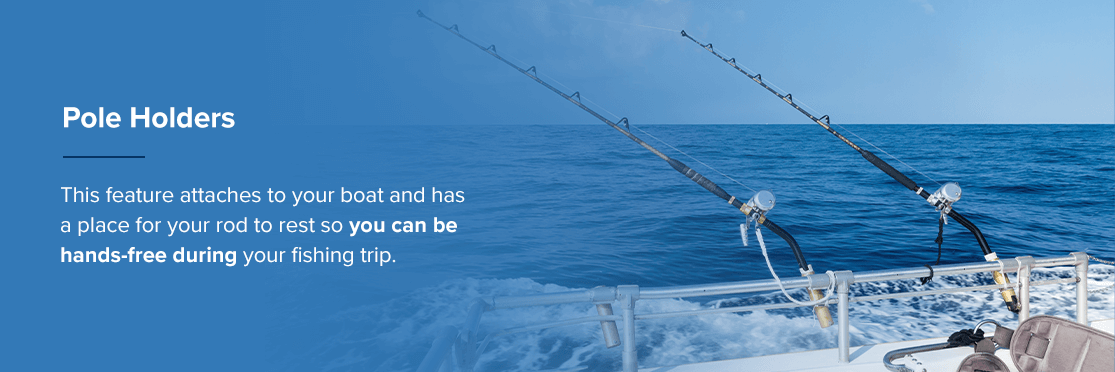
COOLER
Whether you need a spot to hold your favorite beverages or to store any great catches, bring a cooler full of ice on your fishing trip.
Some people fish for fun while others may fish for food. It’s important to check with local regulations on what fish you can keep.
MEASURING STICK
If you’re planning on keeping some of your catches during your fishing trip, make sure you bring a measuring stick with you. Local fishing regulations will explain the size requirements for fish you can keep and which ones you need to toss back. It’s also helpful to know how big your biggest catch is for your records.
GLOVES
Since you’ll be catching creatures you’re unfamiliar with, it’s beneficial to wear fishing gloves when handling fish. Some fish may have fins that are sharp or be poisonous, so wearing gloves will keep you safe when unhooking fish or holding them for a photo.
Where to Go Fishing on a Boat
The beauty of fishing on a boat is deciding where you’ll adventure for your fishing trip. Different bodies of water are home to various creatures, and you’ll get a different experience exploring new boating locations.
Some of the places you can go fishing on your boat include:
- Freshwater fishing: If you’re taking your boat out on the lake or river, you’re going to get the freshwater fishing experience on your boat. Freshwater fishing is a great place for beginners to start because you’ll know what fish you can catch. At freshwater fishing locations, you’ll find species like trout, pike, bass, catfish and sunfish.
- Saltwater fishing: Fishing along the coastline is an experience you’ll remember. You’ll explore the ocean waters and catch various species on your boat fishing trip. A fun part of saltwater fishing is that you don’t know what you’ll catch — you can see what’s common in that area, but you can reel up nearly any sea creature.
- Deep-sea fishing: If you want to catch some monster-sized fish, explore the possibilities of deep-sea fishing. The open ocean is home to some huge fish, and, like traditional saltwater fishing, you never know what you’ll hook on your fishing line.
Tips for Fishing on a Boat
This guide to fishing on a boat can help you have a great first fishing trip on your boat. Before you pack up your gear and set off on the water, check out these helpful tips of what you need to know to fish on a boat:
- Select a lure that matches the color of the water and surroundings. Bring multiple colors in case you don’t get any bites on one lure.
- Use gear and accessories that correlate with the size of fish you’re trying to catch.
- Try fishing early or late. Fish tend to bite more early in the morning or right at dusk.
- Learn about the tides and currents in your fishing location.
- Try to use new hooks or sharpen used hooks.
- Select the right fishing line. You can find different brands for freshwater and saltwater fishing.
- Make sure your lures look life-like.
- Match your lures to the type of food your fish like.
- Research before heading out to a new fishing location. See what fish are common to the area and what you can keep.
- Set your reel drag so that your line is less likely to break.
Formula Boats Great for Fishing
If you want to combine an excellent fishing boat with a luxurious boat with other unmatchable features, check out the various models from Formula Boats:
- 430 Super Sport Crossover: This 430 Super Sport Crossover model has a spacious lounge that is perfect for a day of fishing on the water.
- 430 All Sport Crossover: The 430 All Sport Crossover is one of the best boats for fishing in the Formula Boats lineup. This boat is ideal for fishing with a temperature-controlled fish box, cutting board, a grill with splash guard and more features.
Contact Formula Boats Today
Are you ready to find your next fishing boat? Our fishing boats guide can help jump-start your search. Request a catalog today to check out all of the models we offer.

